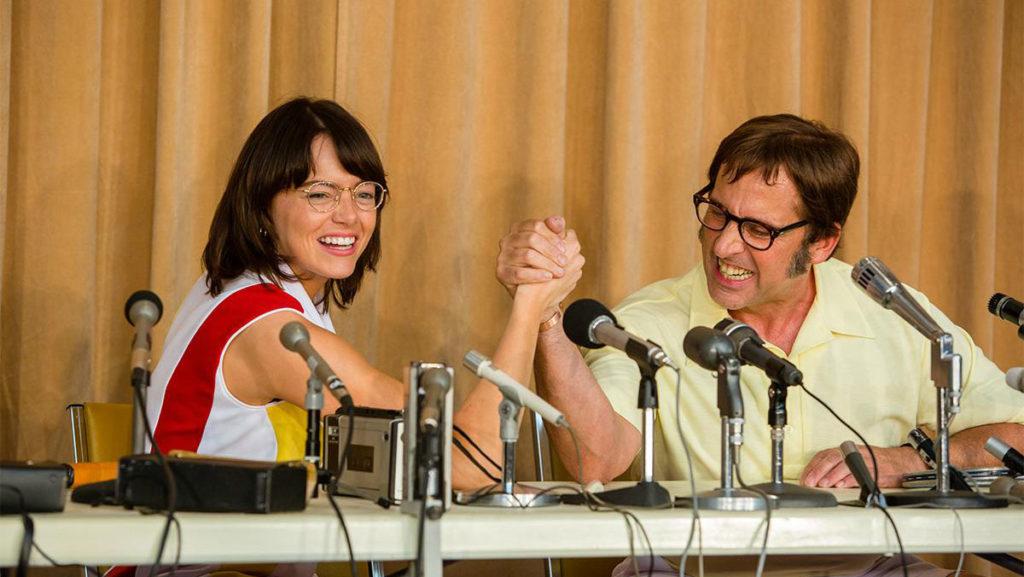Sports films have been beaten to death in the world of cinema, and rarely does one come about that truly does justice to both the sport and the characters involved. “Battle of the Sexes” manages to shed light on one of the most socially important tennis matches ever played. With a message that displays the importance of standing up for yourself and maintaining fearlessness, the film manages to tell the story of this historical event while maintaining a moving and empowering message.
“Battle of the Sexes” is directed by Jonathan Dayton and Valerie Faris and stars Emma Stone as world famous tennis player, Billie Jean King, and Steve Carell as washed up former male tennis superstar, Bobby Riggs. Their famous rivalry became a cultural spectacle that drew in millions of viewers and gained traction within the women’s movement. The film portrays both the actual event and the societal importance with deliberate care and sensitivity.
The direction on display here by Dayton and Faris is truly wonderful, and they manage to create an environment that both looks and feels like 1970s California. Although King is clearly the main protagonist of the story, “Battle of the Sexes” does a brilliant job at illustrating Riggs as a person with real wants, needs, and struggles rather than a relentless villain. There are moments where the viewer is rooting for Bobby, despite his absurd antics. This departure from traditional plot structure, coupled with the vintage style, sets “Battle of the Sexes” apart from other period piece dramas.
With two massively intricate characters on display, both lead actors were given an immense amount of material to work with. Stone seems to establish herself as a better, more serious actress with every job she takes, and this is certainly no exception to that rule. Stone does something here that she’s never done before, portraying a strong tennis player struggling with her sexuality and the culture of sexism in the United States. This is one of Stone’s standout performances because of how she branches out from her typical persona of the quirky young dreamer.
As for her counterpart, Carell is hilarious as the washed up, hyper-masculine Bobby Riggs. Carell’s performance is both gut-bustingly funny when we see his antics on and off the court, and truly tragic when we experience his personal life with his wife, and the way their marriage is being negatively affected by his gambling. Carell has shown his dramatic range before in films like “Foxcatcher,” but this is easily the best demonstration of both dramatic and comedic styles in a single film. Sarah Silverman, Andrea Riseborough, Bill Pullman, Alan Cumming and Austin Stowell also make memorable appearances, all of whom are given their moment in the spotlight. It is also notable that each of the supporting cast members are given only a moment in the spotlight and nothing more, so as to not distract from the primary plotline. The supporting cast is clearly underdeveloped in order to better shed light on the primary two characters, which certainly aids the film in better representing the two characters instead of getting bogged down in extraneous details.
“Battle of the Sexes” rarely falters, making it an incredibly moving and entertaining time at the theater. That being said, the film’s beginning feels rather scattered because it does not show the opening events in discreet detail. Specifically, toward the beginning of the film, Billie Jean creates her own tennis tournament, and many of the locations and overall development are glossed over in favor of getting to the big match. This lack of detail and fast pacing is understandable. Adding too much minutia would bog down the film and detract from the snappy pacing. It made the beginning feel slightly scattered and gives the sense that the directors were worried about slowing down their film, even though the details would have helped.
The political relevance of this film is perhaps the most eye–opening aspect, as it shows the pressures of being a professional athlete but the struggles of someone who is coming to terms with her sexual identity. The way it deals with Billie Jean’s sexuality is so incredibly natural — it does not feel like her romance is being forced into the film. This allows for a very open and romantic story that feels deeply emotional to our characters. This demonstration of homosexuality also shows just how far we’ve come as a society, but also reminds us that these issues are still not completely resolved.
“Battle of the Sexes” is a must–see film if only for the amazing political commentary it provides. The breathtaking performances and unbelievable atmosphere created by the directors work in tandem to make it one of the most powerful films of the year.




















